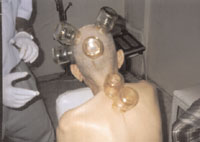
Dr. Abdulaziz Aqlan to Yemen Times: Bloodletting is a popular branch of medicine, needs protection from quacks [Archives:2005/858/Health]
July 11 2005
 |
Taiz Bureau
Undoubtedly, curing illnesses through bloodletting is part of the Prophetic medicine. Bloodletting has proved itself to be efficacious in treating many diseases. Its favorable effect is acknowledged by modern medicine. It is now widely practiced at specialized clinics in some western countries. It is also taught as part of medicine schools' curricula in those countries while this profession has been neglected by its original practitioners, Arabs.
To know more about bloodletting and its benefits we interviewed Dr. Abdulaziz Aqlan, M.A. in natural medicine. Before he sets his lance into the skin of a patient, we started our conversation:
Q: What is the method you will be using with this patient and other patients?
A: Usually I use the Chinese method. It is the popular one because it is practical, safe and can be guaranteed. It depends on glass cups bought by the patient so that to ensure that they are clean and not second-hand. This is meant to prevent infection. The rest are simple tools such as local anesthetic, new razor, an oily substance (Vaseline), and cotton.
Q: How do you identify parts of the body that require bloodletting?
A: This depends on pain and the disease a patient suffers. The method is as you see. This patient has a brain clot. I put some of the oily substance on his bare head, the upper part of the neck towards the hairline, upper part of the back and between the shoulders. Then fire is directed momentarily into the glass cups so that oxygen is exhausted and cups get easily attached to the specified part of the body for five minutes until they leave prominent red marks. Then they are detached and the anesthetic is spread on the round marks in which blood is formed. Then the lance is used to make small slits. We use then the cups to collect the let blood.
Q: How long does an average bloodletting operation last?
A: About fifteen minutes. Blood-filled cups are then set aside and the slits are cleaned.
Q: How is bloodletting useful to the body?
A: Bloodletting has the benefit of renewing the blood circulation. It rids the body of the blemishes trapped in the body for a long time such as old cells. It helps produce new active blood cells. Bloodletting stimulates the parts of the human body to do their usual activities and get rid of laziness.
Q: There are people who practice bloodletting because their fathers used to do that or because of unschooled experience. Do you think that formal education is necessary for such a profession or not?
A: Definitely it is necessary. Professional bloodletting needs a specialist. This is related to the medical profession and reputation. It something related to people's lives. There must be controls. This profession should be protected from quacks. We are in the age of specialization.
Q: Can you unconditionally perform bloodletting?
A: Of course there are certain restrictions. Sometimes it is necessary to consult a specialist physician to know whether the patient can undergo a bloodletting operation or not. Such restrictions are high temperature because of inflammations, malignant tumors, blood circulation deficiency, extreme fatigue, and knee swellings. Such things cannot be diagnosed only by a specialist physician.
Q: Does bloodletting have any side effects?
A: If practiced properly and professionally, bloodletting can never have side effect. I did not observe that the cases I treated showed side effects or complications.
Q: What diseases do you treat through bloodletting? Do all patients benefit from it?
A: Bloodletting can be used to treat many illnesses such as severe headaches, blood clots, diabetes, rheumatism, reproductive malfunctions, sterility, and other diseases that can be treated by bloodletting with different degrees of success. Of course, there are some people who do not get better. This invites research and investigation.
Q: Can you perform bloodletting whenever you like? Are there certain times when it is recommendable?
A: Some do it at specific times in the year such as in spring. By experience, however, bloodletting can be performed at different times throughout the year with varied degrees of success. A patient, for example, who comes at the beginning of summer or winter can not be told to come next year. We just perform it. We advise patients not to eat food within at least the two hours before bloodletting operations.
Q: Is there any comment you would like to add?
A: We appreciate the efforts of Yemen Times which came to us to see and depict our trade. People should know more about it and about the diseases we treat through bloodletting as an alternative to conventional medicine.
——
[archive-e:858-v:13-y:2005-d:2005-07-11-p:health]


